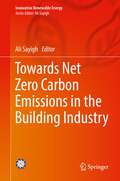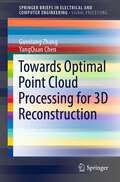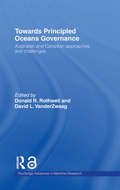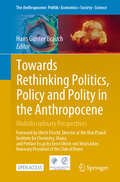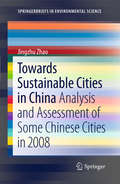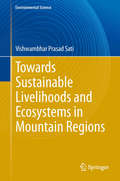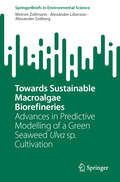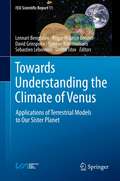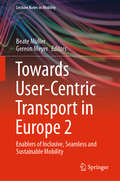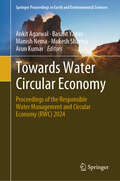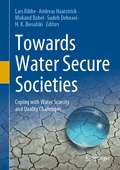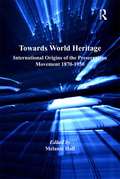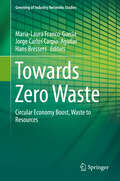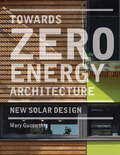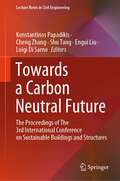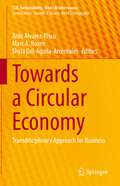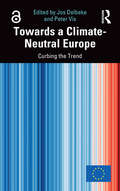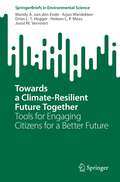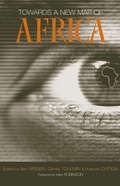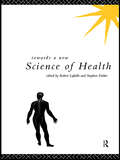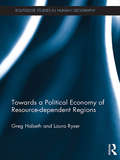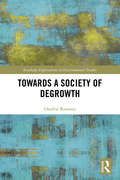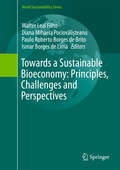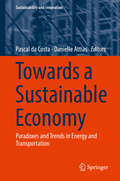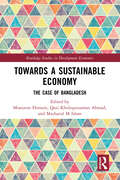- Table View
- List View
Towards Net Zero Carbon Emissions in the Building Industry (Innovative Renewable Energy)
by Ali SayighTowards Net Zero in the Building Industry looks at the contributions that the building and construction industry can (and must) make to help achieve net zero carbon emissions. The building industry accounts for close to 40% of global emissions and this book brings together a global group of contributors from 15 countries to examine ways in which the industry can help with overall CO2 reduction. Coverage includes factors such as building design strategy, materials selection, use of local materials with a low carbon imprint, renewable energy use, energy conservation, greenery and appropriate aesthetics, building size and scale, climate suitability, building functionality and comfort, material recycling, and adoption of green policies. Chapter 6 is available open access under a Creative Commons Attribution 4.0 International License via link.springer.com.
Towards Optimal Point Cloud Processing for 3D Reconstruction (SpringerBriefs in Electrical and Computer Engineering)
by YangQuan Chen Guoxiang ZhangThis SpringerBrief presents novel methods of approaching challenging problems in the reconstruction of accurate 3D models and serves as an introduction for further 3D reconstruction methods. It develops a 3D reconstruction system that produces accurate results by cascading multiple novel loop detection, sifting, and optimization methods.The authors offer a fast point cloud registration method that utilizes optimized randomness in random sample consensus for surface loop detection. The text also proposes two methods for surface-loop sifting. One is supported by a sparse-feature-based optimization graph. This graph is more robust to different scan patterns than earlier methods and can cope with tracking failure and recovery. The other is an offline algorithm that can sift loop detections based on their impact on loop optimization results and which is enabled by a dense map posterior metric for 3D reconstruction and mapping performance evaluation works without any costly ground-truth data. The methods presented in Towards Optimal Point Cloud Processing for 3D Reconstruction will be of assistance to researchers developing 3D modelling methods and to workers in the wide variety of fields that exploit such technology including metrology, geological animation and mass customization in smart manufacturing.
Towards Principled Oceans Governance: Australian and Canadian Approaches and Challenges (Routledge Advances in Maritime Research)
by Donald R. Rothwell David L. VanderZwaagAustralia and Canada have been at the forefront of efforts to operationalize integrated oceans and coastal management. Throughout the 1990s both countries devoted considerable effort to developing strategies to give effect to international ocean management obligations. This key book focuses on principles of marine environmental conservation and management, maritime regulation and enforcement, and regional maritime planning and implementation. With contributions from respected scholars, this informative book collectively assesses the obligations, compliance, implementation and trends in international ocean law, particularly in giving effect to an Oceans Policy, regional maritime planning, international oceans governance, and maritime security. This book will be of interest to all academics involved with maritime studies and international law.
Towards Rethinking Politics, Policy and Polity in the Anthropocene: Multidisciplinary Perspectives (The Anthropocene: Politik—Economics—Society—Science #35)
by Hans Günter BrauchHumankind faces two anthropogenic threats to its survival that are closely linked. The first is the end of the Holocene and the start of the Anthropocene, which was marked by the test of a nuclear bomb on 16 July 1945. In the prevailing peace and security narrative, nuclear weapons and the ‘other’ (country, bloc or alliance) pose a perceived threat to humankind’s survival. In the Anthropocene narrative, ‘we are the threat’ through our way of life and the burning of fossil fuels. The start of the Anthropocene coincides with a change in the international order with the setting up of the UN and the Bretton Woods Institutions. Three stages of this order are distinguished: the Cold War (bipolarity), the post-Cold War era (unipolarity), and the end of the rule-based global liberal order (multipolarity) on 24 February 2022. In this book ten multidisciplinary perspectives discuss complexity, Anthropocene geopolitics, peace and security discourses and the debate on the Anthropocene, planetary boundaries, complex crises and integrative geography in the Anthropocene, governance and politics, and the Patriacene and gender. Both existential threats for humankind are illustrated by cover photos of the first nuclear weapons test on 16 July 1945 and by Category 5 Hurricane Otis, an extreme weather event impacting on Acapulco in Mexico on 25 October 2023. The Anthropocene as a new epoch of Earth history coincides in 1945 with a change in the international order. In the security and peace narrative, the ‘other’ and nuclear weapons pose an existential threat; in the Anthropocene narrative. This dual existential change requires a rethinking of politics, policy and polity. In the social sciences, the Anthropocene is being discussed from multidisciplinary perspectives (geography, political science, and peace, security, and gender studies). This is an open access publication.
Towards Sustainable Cities in China
by Jingzhu ZhaoTo promote China's sustainable city construction and development, this Brief has preliminarily used an assessment indicator system and development index of a sustainable city, based on a summary and analysis of the existing Sustainable City theories and practices both at home and aboard. Meanwhile, mainly based on the data from 2008, this Brief has made a tentative assessment of the development level of Sustainable City in some major Chinese cities.
Towards Sustainable Livelihoods and Ecosystems in Mountain Regions
by Vishwambhar Prasad SatiSustainable livelihoods and ecosystems are far-reaching and burning issues in the wake of high growth of population, low production and per ha yield of crops and depletion of biodiversity resources. Mountainous regions of the world are facing the menace of poverty, food insecurity and malnutrition. Further, tremendous growth in population and slow pace of development have together forced most of the population to live below poverty line. Traditionally depending upon cultivating subsistence crops for food requirement, the people living in mountainous region are unable to produce sufficient food grains to run their livelihood smoothly. The Himalayas is one of the world's biodiversity hotspots and has an abundance of natural resources: land, water and forest - life sustaining factors. The geo-environmental conditions - climate and landscape further enhance the possibility of sustainable livelihoods through eco-tourism, harnessing water resources and utilizing forests and their products sustainably. Diversifying agricultural practices through cultivating cash and cereal crops and enhancing livelihood options through extensive use of timber and non-timber based forestry products can help to eradicate poverty and provide food security. This book consists of an introduction and nine chapters, covering geo-environmental setting, socio-economy and population profile, sustainable livelihoods: diversification and enhancement, livelihood analysis, development of tourism and hydroelectricity, case studies, mountain ecosystems, sustainable mountain development and also presents a conclusion.
Towards Sustainable Macroalgae Biorefineries: Advances in Predictive Modelling of a Green Seaweed Ulva sp. Cultivation (SpringerBriefs in Environmental Science)
by Meiron Zollmann Alexander Liberzon Alexander GolbergMarine biorefineries of macroalgal (seaweed) feedstock are sustainable sources of food, materials, and energy, and can alleviate the growing pressure on land and freshwater resources. Development of an environmentally friendly seaweed biorefinery at an industrial scale requires a better understanding of the seaweeds’ life cycle and improving the inefficiency of on- and offshore cultivation technologies and downstream processing. This study addresses the challenges of developing a reliable, efficient, and continuous macroalgae feedstock supply through an enhanced understanding of the cultivation dynamics of the green macroalgae Ulva. We identified and focused on six knowledge gaps in the macroalgae cultivation process: (i) insufficient knowledge regarding the combined effect of nutrient concentrations and relative water-thallus velocity on growth rates of Ulva sp.; (ii) lack of exergy analysis of macroalgae cultivation systems; (iii) poor information regarding the potential growth rates of macroalgae in the Eastern Mediterranean Sea (EMS) deep seawater (DSW) nutrient concentrations; (iv) a lack of high-resolution (time scale of hours-to-days) macroalgae growth and nutrient models describing the dynamics of ambient N concentrations, internal N content, and growth rate; (v) poor knowledge about nutrient and growth dynamics of Ulva sp. when cultivated in naturally varying environmental conditions offshore the EMS; and (vi) a lack of multi-scale nutrient removal and macroalgae growth dynamics model relating to temporal and spatial variations. We attempt to fill these gaps by measuring growth rates and chemical compositions of Ulva sp. macroalgae in cultivation experiments in different systems and under different conditions and by developing models that progress from an energy balance model, through a basic growth model, to a more advanced physiological model, all based on experimental results. Altogether, we create a methodology and a framework for future precision seaweed farming.
Towards Understanding the Climate of Venus
by David Grinspoon Sebastien Lebonnois Lennart Bengtsson Symeon Koumoutsaris Roger-Maurice Bonnet Dmitri TitovESA's Venus Express Mission has monitored Venus since April 2006, and scientists worldwide have used mathematical models to investigate its atmosphere and model its circulation. This book summarizes recent work to explore and understand the climate of the planet through a research program under the auspices of the International Space Science Institute (ISSI) in Bern, Switzerland. Some of the unique elements that are discussed are the anomalies with Venus' surface temperature (the huge greenhouse effect causes the surface to rise to 460°C, without which would plummet as low as -40°C), its unusual lack of solar radiation (despite being closer to the Sun, Venus receives less solar radiation than Earth due to its dense cloud cover reflecting 76% back) and the juxtaposition of its atmosphere and planetary rotation (wind speeds can climb up to 200 m/s, much faster than Venus' sidereal day of 243 Earth-days).
Towards User-Centric Transport in Europe 2: Enablers of Inclusive, Seamless and Sustainable Mobility (Lecture Notes in Mobility)
by Gereon Meyer Beate MüllerThis book gathers contributions from researchers and practitioners that foster user-centric, cross-modal and sustainable transport systems in Europe. It reports on cutting-edge approaches discussed within the project MOBILITY4EU, a Coordination and Support Action funded by the European Commission, and presented at the second conference “Towards User Centric Transport in Europe” that took place in Brussels in Fall 2018. The respective papers describe innovative approaches to improving urban mobility and accessibility, achieving zero-emission mobility, and guaranteeing, seamless operations. Co-creation approaches are also discussed. Highlighting technological, socio-economic and political strategies alike, the book provides researches and stakeholders with a comprehensive, timely snapshot of current measures and challenges for the mobility of tomorrow.
Towards Water Circular Economy: Proceedings of the Responsible Water Management and Circular Economy (RWC) 2024 (Springer Proceedings in Earth and Environmental Sciences)
by Mukesh Sharma Arun Kumar Basant Yadav Ankit Agarwal Manish NemaResponsible water management and circular economy aims to establish a common understanding of circular economy principles and resilience in the water sector and to support countries in the implementing those principles. It is essential for water security to deal with the effect of climate change. It can be achieved through smart water management, use of non-conventional water resources, rejuvenation of natural water systems, using advance tools and techniques and adaptation strategies. It will help in improving the water availability in terms of quantity as well as quality and human health. Smart water governance and educating society can also play an important role in achieveing the Sustainable Development Goal (SDG 6) “Water for all“. The book aims to accelerate interaction among various stakeholders.
Towards Water Secure Societies: Coping with Water Scarcity and Quality Challenges
by Lars Ribbe Mukand Babel Andreas Haarstrick Sudeh Dehnavi H. K. BiesalskiThis book describes the water security challenges with focus on water scarcity and quality in our rapidly changing world. Achieving water security is essential to promoting economic and social development, as well as resource sustainability and ecosystem integrity. Questions of water security are central to recent global agreements such as the Sustainable Development Goals (SDGs), the Paris Agreement on Climate Change, and the Sendai Framework for Disaster Risk Reduction. The thematic areas discussed here support the SDGs, with special attention to Goal 6 (“Ensure availability and sustainable management of water and sanitation”). The book is a collection of studies from engineering, social and environmental disciplines and aims at giving a balanced overview of the current , complex discourse on water scarcity and quality. It offers a source of inspiration and information for researchers, policymakers, planners, and practitioners concerning the further development of concepts, approaches, and methodologies for promoting water secure societies.
Towards World Heritage: International Origins of the Preservation Movement 1870-1930 (Heritage, Culture and Identity)
by Melanie HallHistoric preservation, whether of landscapes or buildings, was an important development of the nineteenth century in many countries. There is however surprisingly little understanding about how it took place, and research into it is narrowly focused. For example, generally landscape preservation from this time is examined separately from buildings; preservation is seen in terms of national narratives, or considered within the contexts of area studies, and it is usually seen from a specific disciplinary perspective. All of these later categorizations did not apply at the time and consequently, a very partial view is achieved. In order to begin unlocking a very complex phenomenon that has helped to define our own age, this dynamic collection of essays brings together an international and transdisciplinary line-up of academics and practitioners to reconsider preservation's origins in the second half of the nineteenth and early part of the twentieth century. With a focus on Britain and the British Empire, and including case studies from the United States, Canada, Sweden, France, Germany, Sri Lanka, 'The Holy Land', and Turkey, this book places preservation in imperial, international, and national contexts, demonstrating that there was far more interaction between different countries in this arena than may be supposed and revealing remarkable but hitherto hidden overlaps and intersections. It examines three main themes: the influence of religion; the political and sub-diplomatic aspects of preservation; and the professionalization of preservation practice. Internationalizing trends already existed through the churches, the universities, and the diplomatic services, as well as familial ties that had an important impact on preservation's epistemic communities and its targets. Other internationalizing factors include an interest in national histories and the histories of architecture and art, particularly when known through illustration; a growing interest in biography especially of 'founding fathers' or famous literary figures; and tourism. Although the focus is on architectural preservation, this book demonstrates that, in this formative period, the preservation of buildings and landscapes needs to be considered together - as it often was at the time - and in context. The conclusion reached is that the preservation movement has to be understood in imperial and international contexts, rather than in simply national or regional ones.
Towards Zero Waste: Circular Economy Boost, Waste To Resources (Greening of Industry Networks Studies #6)
by Hans Bressers María-Laura Franco-García Jorge Carlos Carpio-AguilarThis book draws on insights that originated from the Circular Economy and Zero Waste initiatives. Together these approaches try to boost the shift from “waste” to “resources” management. The content of this book is partially organized from a stakeholder perspective, revealing the managerial implications for public and private actors. Next to public policies, also illustrations come from the private sector. Petstar, Texperium and Walmart generously shared some of their best practices at in this regard. Cases from China, Indonesia, Mexico, the Netherlands and Romania are discussed in this book. In all of these different contexts they show ways to create collaborative schemes in order to “retain” the resources’ values as much as product quality and financial circumstances permit. The reader can thus take advantage of the pragmatic viewpoints that aim to inspire policy makers, researchers, students, organisations and communities to boost the needed changes towards a Zero Waste Economy.
Towards Zero-energy Architecture: New Solar Design
by Mary GuzowskiThis book explores the theories, practices and principles of new approaches to solar architecture that foster both design excellence and low-energy use. In response to the challenges of global warming and climate change, design and technology enable architects to achieve greater performance standards while at the same time developing an environmental aesthetic. The book showcases ten award-winning buildings to illustrate the aesthetic and technological design integration of solar response in contemporary zero-energy and low-energy architecture. For each project there is a detailed examination of the local climate, the design and construction, and the technology used to reduce energy use. Towards Zero-energy Architecture is a much-needed call for the design professions to redefine architecture to help solve ecological problems.
Towards a Carbon Neutral Future: The Proceedings of The 3rd International Conference on Sustainable Buildings and Structures (Lecture Notes in Civil Engineering #393)
by Luigi Di Sarno Konstantinos Papadikis Cheng Zhang Shu Tang Engui LiuThis book collects the contributions presented at the 3rd International Conference on Sustainable Buildings and Structures ICSBS2023 (Suzhou, China, 17-20 Aug 2023). This conference represents a effort of Design School of Xi'an Jiaotong-Liverpool University, together with international and local co-organizing partners from academia, industry, and professional societies. The collection aims at sharing the state-of-the-art sustainable approaches for future carbon neutrality in the built environment. This work covers a wide range of topics, including sustainable materials and infrastructures, green building design and engineering, smart construction engineering and management, sustainable urbanism and architecture, circular economy, and innovation in education for sustainable development. The contributions were selected through a rigorous peer-review process internationally. They presented the state-of-the-art ideas and approaches in engineering practices and education towards achieving acarbon-neutral tomorrow in the built environment. The collection will be of interest to academics, professionals, industry representatives, and local government officials involved in civil engineering, architecture, urban planning, structural engineering, construction management, and other related fields. The readers will be inspired by novel techniques and ideas of carbon-neutral sustainable development for the built environment.
Towards a Circular Economy: Transdisciplinary Approach for Business (CSR, Sustainability, Ethics & Governance)
by Marc A. Rosen Aldo Alvarez-Risco Shyla Del-Aguila-ArcentalesThis volume presents a transdisciplinary approach to implementing a circular economy in international business. Written by global experts, this book provides a detailed and professional focus on issues that must be improved in order to successfully implement a circular economy in a variety of industries. The book begins with a discussion of the theoretical aspects of circular economy and the challenges of going from theory to practice. The following chapters present case studies on the circular economy in different sectors of international business such as food systems, mineral processing, water management, energy process, waste management, the cement industry, and 3D printing. Issues such as the role of SMEs in the circular economy, and the progress towards circular economy 3.0, and strategies for teaching the circular economy are also discussed. The volume ends with a critique of the concept of circular economy and suggestions for future research avenues. Written with multiple stakeholders in mind, this volume will be of interest to researchers and students of economics, sustainability, international business, and management as well as industry professionals and governments working towards establishing a circular economy in their fields and jurisdictions.
Towards a Climate-Neutral Europe: Curbing the Trend
by Jos Delbeke Peter VisThis book explains the EU’s climate policies in an accessible way, to demonstrate the step-by-step approach that has been used to develop these policies, and the ways in which they have been tested and further improved in the light of experience. The latest changes to the legislation are fully explained throughout. The chapters throughout this volume show that no single policy instrument can bring down greenhouse gas emissions. The challenge facing the EU, as for many countries that have made pledges under the Paris Agreement, is to put together a toolbox of policy instruments that is coherent, delivers emissions reductions, and is cost-effective. The book stands out by the fact it covers the EU’s emissions trading system, the energy sector and other economic sectors, including their development in the context of international climate policy. This accessible book will be of great relevance to students, scholars and policy makers alike.
Towards a Climate-Resilient Future Together: Tools for Engaging Citizens for a Better Future (SpringerBriefs in Environmental Science)
by Mandy A. van den Ende Arjan Wardekker Dries L.T. Hegger Heleen L.P. Mees Joost M. VervoortAlthough many local authorities underline the important role of citizens in climate adaptation, many experience difficulties with organizing citizen participation in a way that is meaningful to both citizens and policymakers. Climate change is for many simply not a top priority. Besides, the future is often rather abstract to people, citizens in particular. We argue that practical tools are needed to help citizens structure the process of thinking about and designing the future of their living environment under the impacts of climate change. The toolbox Towards a climate-resilient future together offers practical foresight methods and tools for organizing citizen participation in the process of building climate-resilient futures. It provides an overview of the state the art of and hands-on guidance for executing participatory foresight methods and showcases some of the lessons learned from several international research programs on citizen engagement. In doing so, the toolbox can assist practitioners, students and academics concerned with the question of how local communities in urban and rural areas could adapt to climate change impacts and become more resilient in the future. It is suitable for readers without any experience in citizen participation and/or foresight, while more experienced readers will find innovative combinations of methods and tools that are unique within the field of citizen participation and foresight..
Towards a New Map of Africa
by Ben Wisner Camilla Toulmin'The big, era-defining questions and, at last, the subtle, tenable answers, teased out without clich or compromise. A vital volume at a critical moment.' Dr Augustus Casely-Hayford, Director, Africa '05 'This book dispels the myth of a uniformly hopeless, hungry continent. It shows just how extraordinarily diverse Africa is and how much it has changed in the last 20 years.Full of fresh thinking on problems that face Africa and new African approaches to development.' Richard Dowden, Director, Royal African Society This ground-breaking book, with a foreword by former President of Ireland (199-997) and UN Human Rights Commissioner (1997 2002) Mary Robinson, uniquely distils the complex issues surrounding Africa at the beginning of the 21st century. African and Western scholars provide a fascinating 'map' for the reader to navigate between issues such as urban and rural livelihoods, the potential of fresh water fishing, health, the HIV/AIDS crisis, conflict and efforts at peacemaking. Also included are critical assessments of Africa's role in the global economy, the growth of regional economic cooperation within Africa, the influence of ethnicity on the continent's politics, the evolution of its political institutions, and the impact of Africa's legal systems on its development. A substantial introductory essay by the editors measures the distance Africa has travelled and the lessons it has learned since Africa in Crisis, the classic Earthscan book, was published in 1985. Ben Wisner is visiting research fellow at DESTIN, London School of Economics and at Benfield Hazard Research Centre, University College London, and visiting professor of environmental studies, Oberlin College, USA. Camilla Toulmin is Director of the International Institute for Environment and Development. Rutendo Chitiga is a freelance writer and editor, and has a postgraduate degree in environment and development.
Towards a New Science of Health
by Stephen Fulder Robert LafailleThe foundations of health sciences need rethinking. The mechanistic biomedical model, apparently so successful in the past, is now criticised for failing to explain what health is and how it can be preserved. The world's major health problems no longer seem so controllable. A new science of health is needed, a radical spirit of inquiry which draws on a broad knowledge base and a variety of approaches, a science which does not balk at reconceptualising health and building on innovative research. Towards a New Science of Health provides a radical alternative to current biomedical thinking. Presenting an overview of all major paradigms in the health sciences, their historical development, socio-cultural background and value, the book provides a framework for innovative thinking in health. Drawing on a range of disciplinary perspectives and focussing on a variety of approaches - systems theory, human experience and biography, the healing process and social relations - the authors aim to bridge the gap between personal experience and scientific knowledge.
Towards a Political Economy of Resource-dependent Regions (Routledge Studies in Human Geography)
by Laura Ryser Greg HalsethThis book advances our understanding of resource-dependent regions in developed economies in the 21st Century. It explores how rural and small town places are working to find success in a new economy marked by demographic, economic, social, cultural, political, and environmental change. How are we to understand the changes and transformations working through communities and economies? Where are the trajectories of change leading these resource-dependent places and regions? Drawing upon examples from Canada, USA, UK, Australia, New Zealand, and the Nordic countries, these and other questions are explored and addressed by constructing a critical political economy framework of resource hinterland transition. Towards a Political Economy of Resource Dependent Regions is a key resource for students and researchers in geography, rural and industrial sociology, economics, environmental studies, political science, regional studies, and planning, as well as policy-makers, those in industry and the private sector, and local and regional development practitioners.
Towards a Society of Degrowth (Routledge Explorations in Environmental Studies)
by Onofrio RomanoThis book explores the concept of degrowth, beginning from a basic assumption, not of resource depletion, as is common in most literature in the field, but rather from a state of abundance, arguing that there is a vast amount of energy on the planet waiting to be utilized by all its inhabitants. Adopting a sociological approach, Onofrio Romano argues that the growth momentum is not simply a broadly shared “value,” but the physiological outcome of a specific institutional frame. The problem is that in its mainstream formulation the degrowth alternative shares with the growth-led regime some basic anthropological, political, and institutional pillars. In order to build a real alternative, Romano suggests reviewing degrowth in the light of the dépense notion by Georges Bataille. According to Bataille, our societies have no problem with acknowledging scarcity, but with dealing with the surplus energy that calls us to act for a qualified life. So, in order to erase the growth obsession, we have to ward off the “servile” dimension, i.e., the utilitarian activities needed for the mere reproduction of life, to regain sovereignty, as reflected in the de-thinking subject. Innovative and provocative, Towards a Society of Degrowth will be of great interest to students and scholars of degrowth, sociology, social anthropology, political ecology, and ecological economics.
Towards a Sustainable Bioeconomy: Principles, Challenges and Perspectives (World Sustainability Series)
by Walter Leal Filho Ismar Borges de Lima Diana Mihaela Pociovălișteanu Paulo Roberto Borges de BritoThis book gathers contributions from scientists and industry representatives on achieving a sustainable bioeconomy. It also covers the social sciences, economics, business, education and the environmental sciences. There is an urgent need to optimise and maximise the use of biological resources, so that primary production and processing systems can generate more food, fibre and other bio-based products with less environmental impacts and lower greenhouse gas emissions. In other words, we need a "sustainable bioeconomy" - a term that encompasses the sustainable production of renewable resources from land, fisheries and aquaculture environments and their conversion into food, feed, fibre bio-based products and bio-energy, as well as related public goods. Despite the relevance of achieving a sustainable bioeconomy, there are very few publications in this field. Addressing that gap, this book illustrates how biological resources and ecosystems could be used in a more sustainable, efficient and integrated manner - in other words, how the principles of sustainable bioeconomy can be implemented in practice. Given its interdisciplinary nature, the field of sustainable bioeconomy offers a unique opportunity to address complex and interconnected challenges, while also promoting economic growth. It helps countries and societies to make a transition and to use resources more efficiently, and shows how to rely less on biological resources to satisfy industry demands and consumer needs. The papers are innovative, cross-cutting and include many practice-based lessons learned, some of which are reproducible elsewhere. In closing, the book, prepared by the Inter-University Sustainable Development Research Programme (IUSDRP) and the World Sustainable Development Research and Transfer Centre (WSD-RTC), reiterates the need to promote a sustainable bioeconomy today.
Towards a Sustainable Economy: Paradoxes and Trends in Energy and Transportation (Sustainability and Innovation)
by Danielle Attias Pascal Da CostaThis book provides an interdisciplinary account of how technological advances – mainly in the domains of energy and transportation – contribute to the transformation towards a more sustainable economic system. Drawing on methods from engineering, the management sciences and economics, which it combines in the framework of a systems sciences approach, the book presents qualitative and quantitative studies on government regulation, resources management and firms' strategy. Topics covered include the state-market dilemma of government CO2 emission targets, implications of the electrification of the economy, incentives and coercion in government transport policies, and innovations in the electric vehicle industry.
Towards a Sustainable Economy: The Case of Bangladesh (Routledge Studies in Development Economics)
by Moazzem Hossain Qazi Kholiquzzaman Ahmad Mazharul M IslamThe Sustainable Development Goals (SDGs) were introduced by the United Nations (UN) for all member nations with a total of 17 goals and 169 targets to be achieved between 2016 and 2030. The recent pandemic has presented more challenges to achieving the UN’s SDGs. This book examines Bangladesh’s ascendancy in socio-economic terms and the prospects of Bangladesh overcoming the challenges to become a higher-middle-income nation by 2030. This book traces the transformation of Bangladesh from 1996 through 2020 and examines various factors contributing to its success from rural economy, external support, manufacturing, and structural transformation to energy consumption. This book also looks at the challenges and opportunities for Bangladesh as the Fourth Industrial Revolution unfolds and as climate change, to which Bangladesh is highly vulnerable, escalates. This book will be a useful reference document for those who are interested in gaining more insights into inclusive growth and sustainable development from the case study of Bangladesh.
